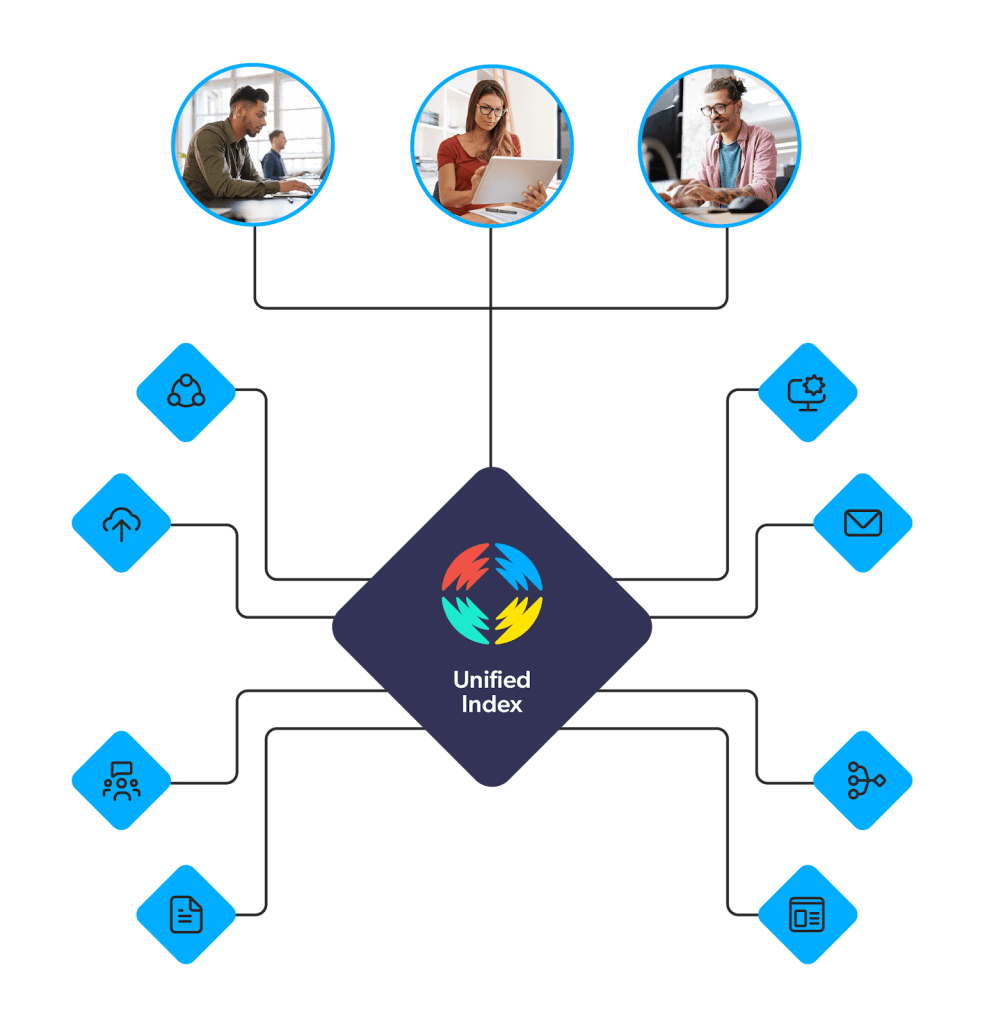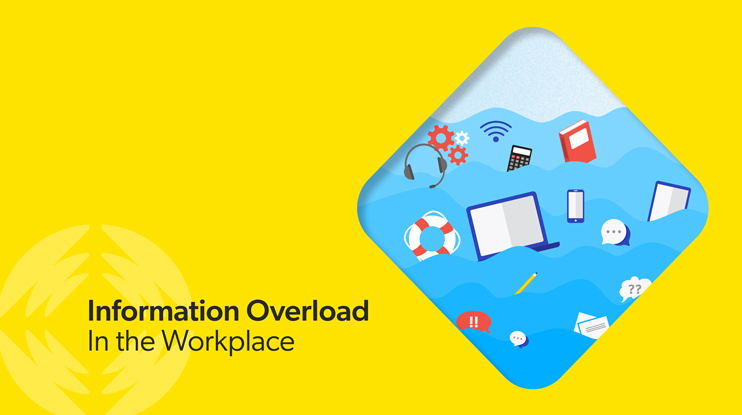Too much information and not enough time to process it all – these are major factors that knowledge workers face across industries, job types, and departments. From constant emails and notifications to the perpetual hunt for information and files across multiple platforms and knowledge repositories, the digital deluge is overwhelming.
Today, like every day, 2.5 quintillion bytes of information will be created; in 2024, 347.3 billion emails are sent per day (most of them to me), 1.7 megabytes of new information is minted every second for every human on earth (the equivalent of an 800-page book); yet only 0.5% of all data is ever analyzed or used for decision making.
Alleviating cognitive overload from too much information requires that businesses take control of the end-to-end employee experience and that means tackling information overload head on. You need to understand the challenge – what it is, why it’s a problem, and what causes it – so you can create an effective strategy to solve it. (Hint: AI can help.)
First, we’ll look at what “information overload” means during this unprecedented time when the vast amount of data and information coming at employees is unrelenting.
What Is Information Overload?
Information overload is the cognitive strain we experience when we attempt to process too much information at once. Employees are at risk of information overload from an overwhelming volume of data or content. Constant interruptions from various communication channels like email, social media, apps, text, and chat drain even more mental energy.
Information overload, as a concept, was popularized by writer and futurist Alvin Toffler in his book Future Shock. Over five decades ago, Toffler wrote, “just as the body cracks under the strain of environmental overstimulation, the ‘mind’ and its decision processes behave erratically when overloaded”. Toffler’s book was published in 1971, but the term “information overload” was coined even earlier than this, back in 1964 by Bertram Gross, a political science professor.
Toffler was concerned with the rising number of television channels (the average city, at the time, had six). Can you imagine? One wonders what men like Toffler and Gross would think of the staggering amount of data we consume and create each and every day in 2024.
Information overload impacts knowledge workers in different ways. It can lead to information anxiety and cause burnout. It creates frustration. It leads to poor morale and can affect employee retention (and not in a good way). All of this adds up to lots of stress and a compromised decision-making process.
In Coveo’s 2024 Employee Experience Industry Report, 34% of the 4,000 computer-using employees we surveyed said they felt frustrated or burnt out when they don’t have the right tools to manage information. This frustration and burnout trickles down to customers since employees can’t quickly respond or find answers when they don’t have access to the right information.
Why Is Information Overload a Problem?
Information overload causes a host of challenges for employees and businesses. Here are some of the top issues companies face:
Stressed and Insecure Employees
Poor access to information creates gaps in knowledge, which leads to insecurity and lack of confidence. When employees can’t find the information they need, they struggle to do their jobs. Their decision quality also becomes compromised. Thirty percent of respondents in our EX survey reported feeling less confident about their work and were reluctant to share information externally because they lacked effective knowledge management tools.
An Inability to Innovate
Being bogged down with too much information has consequences that reach beyond individual employees — workplace overwhelm can hinder or prevent innovation. In Microsoft’s 2023 Work Trend Index, a survey of over 31,000 global employees, nearly two-thirds of leaders (60%) said they worry about a lack of innovation or breakthrough ideas on their teams.
Sifting through data, related articles, and information leaves people with less energy for creative and strategic work. They make poor decisions, feel frustrated, and burned out. Sixty-four percent of respondents in the Microsoft survey said they struggle with having the time and energy to do their job, making them much less likely (3.5X more) to effectively innovate or think strategically.
Low Productivity and Wasted Time
Information overload is time consuming. It creates a kind of needle-in-a-haystack cycle where employees are constantly searching for the tools and resources they need across large swaths of data. Even finding the time to search is a challenge.
Our EX survey found that 62% of employees struggle with finding time to search for information during their workday. This wasted time adds up. Microsoft’s research revealed that workers spend 8.8 hours a week on email and 7.5 hours a week in meetings. That’s over two full days a week not creating anything at all (except more meeting notes).
Poor Employee Retention
Employee retention is another concern. Information overload contributes to job dissatisfaction, which can lead to higher turnover rates. Harvard Business Review (HBR) notes that employees who feel overloaded are less likely to understand company strategy and more likely to quit. That’s not good for the remaining employees’ morale and it’s also costly for businesses who must replace experienced talent and train new hires.
Decision Fatigue
Information overload can stifle effective decision-making and cause decision fatigue. With excessive information available, an organized mind can become disorganized. Employees may make poor choices or delay important decisions, slowing down projects, missing deadlines, and dropping balls.
This type of mental fatigue is supported by research from HBR, which found that employees experiencing high information burden are over seven times more likely to regret their decisions and more than twice as likely to avoid or respond negatively to change. This suggests that information overload impacts both the quality of decisions and an employee’s willingness to make them in the first place.
What Causes Information Overload?
So, what is the source of all this soul-sucking, efficiency-crushing, progress-stalling data?
The very companies that employees serve.
That’s right – the digital data tools that employers think make employees nimbler, better informed, and more effective are doing the exact opposite. The human brain can only process so much, after all. Coveo’s 2024 EX Industry Report revealed myriad alarming effects of information overload, including:
- Inefficiency: Workers spend approximately 3 hours daily searching the available information needed to do their jobs.
- Frustration: 89% of employees search between 1 to 6 data sources every day.
- Confusion: 30% of employees don’t know where to look for the information they need.
- More Frustration: Nearly half of the information that respondents find is irrelevant or unnecessary for their specific roles.
- Burnout: 34% of employees feel frustrated or burnt out when they can’t find the right information.
- Insecurity: 30% of employees feel less confident about either the quality of their work or about sharing information externally.
- Attrition: 7% of the respondents say this poor experience makes them want to leave their company.
The Microsoft Work Trend Index lists some specific workplace scenarios that contribute to information overload. These include:
- Excessive time spent on email
- Constant notifications and interruptions
- Lack of time to focus
- A large amount of (unnecessary) meetings
- Difficulty finding relevant information among outdated or irrelevant documents
- Juggling multiple communication platforms and data sources
In short, people are overwhelmed, less engaged, and less confident. And literally ill.
The infrastructure that organizations build to make reams of information available in a few clicks, empower knowledge workers by providing access to information and data, and enable them to work from anywhere – are unfortunately not always helpful. In fact, these infrastructures are adding to the toxicity of the information age.
How to Manage Information Overload
You need a multifaceted approach to manage information overload. Especially if you want one that addresses the needs of every employee, from individual knowledge workers to IT leaders and everyone in between.
IT and digital workplace leaders should prioritize creating a unified digital experience that enhances employee productivity and engagement.
Finding relevant information quickly requires the right tools and tech for the job at hand — and this is exactly where AI shines.
How AI Search Can Help Information Overwhelm
AI and AI-powered search improves how employees find, access, and utilize information across various platforms and repositories. Here’s how:
- Unify access to your content: AI-powered search solutions like Coveo offer unified search, providing users with the ability to search through every connected content repository. Regardless of where it’s stored or created, there’s a connector for that.
AI and ML models help organize and retrieve information from various organizational knowledge sources, making relevant content more accessible to employees based on their roles and permissions.
Subsets of AI like natural language processing (NLP) give employees the flexibility to search for information in their own words and native language versus trying to match queries with exact content. It’s a more intuitive and user-friendly way to search for answers.

- Information can be embedded in flow-of-work: From well-curated intranets that keep employees up to speed to in-product experiences that enable workers to remain within their daily tools, you can augment rather than change the workday. This easy access combined with more than 17 intelligent ranking factors gets the right information to the right people when they need it.
And there’s the option of combining any of these applications with generative answering. This relieves searchers from needing to click into each individual document to assess which has the information they need.
Of course, if you’re in a highly regulated industry like financial services where wording cannot be changed, smart snippets help address this problem too. It extracts the exact wording from a document and displays it at the top of the search results. Both generative answers and smart snippets are LLM powered.
- Focal point for holistic digital transformation: AI search can do much more than deliver information — it can be the first step to bringing your enterprise into the modern age, and future-proofing it for years to come. Enterprise architecture that removes siloes and helps understand what people need, regardless of where they are in their customer or employee journey? That’s valuable intel!
The first step is convening a Search Center of Excellence. This team pulls together stakeholders from across your organization, giving departments and teams a voice and a sneak peek into what they could gain. Often we’ve heard Coveo customers say that, at first, content or site owners were apprehensive about bringing AI search into their domain. But once they saw the benefits other departments were receiving, they were often quick to ask to be updated next.
AI is a great cure for information overload because it solves the problem of too much information in several ways. It speeds up the process of finding the right information. Unifying search means that your entire enterprise knowledge base is readily accessible from within the tools employees are using every day – the company intranet, Slack, a specialized portal, or your website.
Reduce Information Overload & Empower Employees
AI can also reduce the need for repetitive manual tasks, for example, with algorithms that automatically classify and tag content without human intervention. This makes content management more efficient and information retrieval more effective since it keeps your data current and consistent.
Curious to learn more about what modern companies are doing with AI search to maximize enterprise efficiency? Check out Coveo’s AI-powered digital workplace solutions, and see how enterprises like Adobe, Dell, and Cisco are clinching the lead in their industries.
Dig Deeper
Looking for other trends that may be impacting your workplace, digital or otherwise? Grab a copy of our annual EX Industry Report. This year we took a closer look at the impact of generative AI on businesses, employees, and much more.


